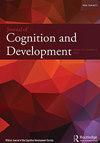以有文化意义的方式研究执行功能
IF 1.6
2区 心理学
Q3 PSYCHOLOGY, DEVELOPMENTAL
引用次数: 6
摘要
儿童执行功能的发展是研究文化差异的一个很好的候选对象,因为它是成为称职的文化活动参与者的必要能力,但它也可能受到文化组织的日常经历的影响,对儿童的发展和学习具有潜在的影响。本研究以尤卡泰克玛雅儿童为研究对象,以人种学为基础,探讨现有理论建构和方法中的文化偏见。尤卡泰克玛雅儿童在一个由家庭、社会关系和工作责任组成的密集网络中自主组织他们的日常活动。然而,由于任务逻辑和要求中固有的一些文化假设,4至8岁儿童的小规模试点样本对许多传统的EF测量方法不感兴趣,而且表现不佳。具体的文化障碍被确定,包括对动机、任务意义、社会互动规则和特定文化信仰的假设。然后开发了一些新颖的任务,包括情境定位,目标驱动的任务,孩子们更有动力参与。为了检验我们分析的准确性,我们提出了一种未来比较研究的设计,包括传统任务(对尤卡坦玛雅儿童来说,既可以在文化上解释,也可以在文化上不合适)和新颖的、情境嵌入的任务,这些任务对尤卡坦玛雅儿童来说很有意义。最后,我们对使用具有文化意义的研究来研究儿童发展的成本/收益进行了分析。本文章由计算机程序翻译,如有差异,请以英文原文为准。
Studying Executive Function in Culturally Meaningful Ways
ABSTRACT Children’s development of executive function is a good candidate for studying cultural differences because it is a necessary capacity for becoming competent participants in cultural activities, and yet it is also likely to be shaped by culturally organized everyday experiences, with potential consequences for children’s development and learning. An ethnographically grounded study with Yucatec Maya children was conducted to explore cultural bias in existing theoretical constructs and methods. Yucatec Maya children autonomously organize their daily activities within a dense web of family social connections and work responsibilities. Yet small pilot samples of 4- to 8-year-olds were uninterested in and performed poorly on many traditional measures of EF due to a number of cultural assumptions inherent in the tasks’ logic and demands. Specific cultural road blocks were identified, including assumptions about motivation, task meaning, rules of social interaction, and specific cultural beliefs. Several novel tasks were then developed, comprised of contextually situated, goal-driven tasks, that children were more motivated to engage in. To check on the accuracy of our analysis we propose a design for a future comparative study consisting of a mix of traditional tasks (both culturally interpretable and culturally inappropriate for Yucatec Maya children), and novel, contextually embedded tasks that were engaging for Yucatec Maya children. We close with a cost/benefit analysis of using culturally meaningful research to study children’s development.
求助全文
通过发布文献求助,成功后即可免费获取论文全文。
去求助
来源期刊

Journal of Cognition and Development
Multiple-
CiteScore
4.00
自引率
0.00%
发文量
29
期刊介绍:
The Journal of Cognition and Development is the official journal of the Cognitive Development Society (CDS). Some CDS members are concerned with basic research or theory; others focus on policy issues and practical applications. The range of interests includes cognitive development during all stages of life, and we seek to understand ontogenetic processes in both humans and nonhumans. Finally, their interests encompass typical as well as atypical development, and we attempt to characterize both biological and cultural influences on cognitive change and continuity.
 求助内容:
求助内容: 应助结果提醒方式:
应助结果提醒方式:


